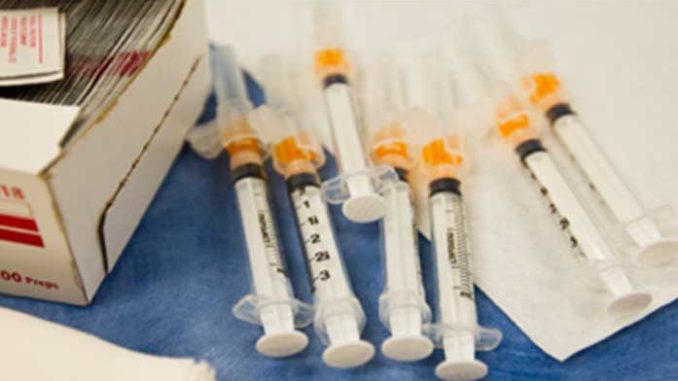
A lawsuit brought by two nursing students of the Maricopa County Community College District (MCCCD) in hopes of obtaining a preliminary injunction to ensure district officials work with about 30 students to accommodate their religious objection to the COVID-19 vaccination came before a seemingly skeptical Maricopa County judge on Monday.
Emily Thoms and Kamaleilani Moreno are only one semester away from graduating from one of the district’s eight nursing programs. Both had already paid for their semester when they were informed that they had to complete their final clinical studies with clinical partners that do not allow for a religious exemption to the vaccine.
At the heart of Moreno and Thoms’ personal objections to the vaccine is the fact aborted fetal cell lines were used in its development. Both women say they would have their career plans and family lives uprooted if they cannot complete their final semester on time.
However, some of the clinical partners that work with MCCCD do not require the vaccination. The problem is, MCCCD would not take any steps to ensure Moreno, Thoms, and about 30 other nursing students were placed with those partners.
Monday’s hearing began with statements by the parties’ attorneys – Colleen Auer on behalf of the two students and five members of Quarles & Brady for MCCCD. Judge Steven P. Logan then peppered the lawyers with several detailed questions, showing he read the hundreds of pages filed with the court since Auer initiated the lawsuit less than two weeks ago.
It was during sworn testimony from Dr. Margi Schultz of the MCCCD nursing program that it was revealed that district officials have received two one-year waivers from the Arizona Board of Nursing since the pandemic began in early 2020. One waiver issued in March 2020 allowed students of MCCCD’s eight nursing programs to receive credit for clinical studies despite the fact the studies were not done in person.
The other waiver, just issued in August of this year, would allow MCCCD to rely back on simulated clinical studies, although Schultz claimed the waiver was only a “backup plan” arranged by district official if it ended up being needed to address future COVID-19 issues.
MCCCD put forth two main arguments during Monday’s hearing about why they should not be required to provide accommodations to the religious exemption students. First, the district contends the 30 or so students “would not suffer a irreparable harm” if forced to wait until Spring, Summer, or Fall 2022 to be placed with a suitable clinical partner.
“What we’re talking about is a slight delay,” one of MCCCD’s attorneys argued, although she admitted the district was not in a position at this time to guarantee when the students could finish their clinical studies.
The other district argument is that there is not enough time to implement alternative clinical options allowed by the Nursing Board’s August 2021 waiver and still ensure students complete the program on time.
Auer appeared to score some points with the judge following Schultz’s testimony that MCCCD nursing officials started the clinical studies placement process back in June. Schultz said officials knew by late August that several students were seeking a medical or religious exemption but made no special effort to help place those students.
Instead, the district contends it has “a legitimate government purpose” in following its current policy of somewhat randomly assigning students to a clinical partner. And officials believe offering refunds to students who had religious objections to the vaccine was a sufficient accommodation, as was allowing the students to take an “incomplete” grade for now.
Auer repeatedly hit on the timeline involved, telling Logan “this should have never gotten to this point.” She also solicited testimony from some of the nursing students who sought religious exemptions and have been impacted by how MCCCD conducted the clinical placements.
One of those students, who is not Auer’s client, testified she was on schedule to graduate in January 2022 but might have to wait up to 12 months to finish the 48 hours of clinical studies she already paid for the semester starting this month.
The same student told Logan she worked as a nursing assistant while going to classes, and was never required to be vaccinated even though she worked in a COVID-19 unit and had been tasked with administering vaccinations to people. All she needed, she told Logan, was for someone to help find her a clinical placement, or allow her to swap with a vaccinated student placed with a clinical partner that will honor a religious exemption.
Logan told the parties he will rule on the preliminary injunction request by the end of the week.
After the hearing, Auer commented on MCCCD’s decision during the summer to draw a line in the sand with nursing students instead of endeavoring to find workable solutions to support students who are just one semester away from graduation. Those district officials have spent much “time, effort, and money” fighting its own students who simply want to receive the education they paid for without sacrificing their sincere religious beliefs, Auer said.
“Had it invested the same time, effort, and money into helping its students succeed in their academic programs, the public would have the benefit of the new nurses we need so desperately, the students would have the education and degrees they worked, paid, and contracted for, and none of this would have had to come at the expense of these students’ fundamental right to the free exercise of their religion under the First Amendment of the Constitution of the United States,” Auer said.
HEAR FROM TWO OF THE NURSING STUDENTS: For Nursing Students Lawsuit Against MCCCD Is A Matter Of Faith
